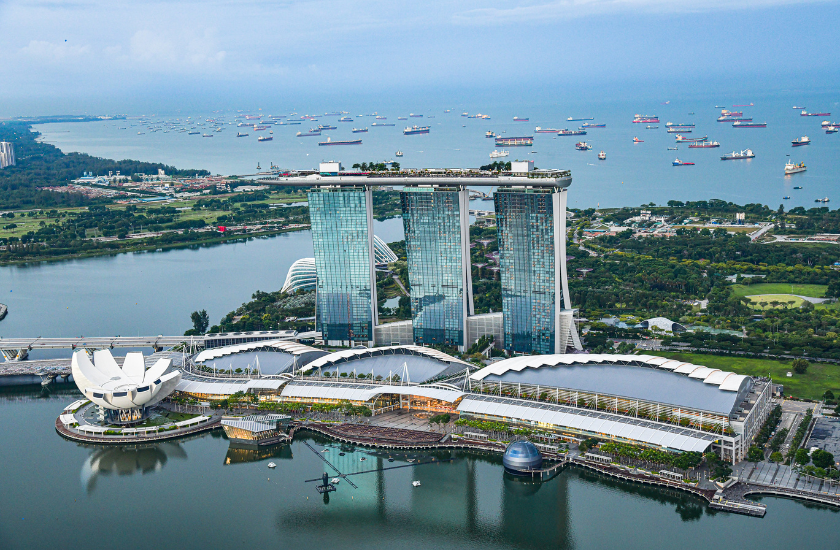Singapore has long held a reputation as a business-friendly hub with a strong regulatory framework, robust infrastructure, and strategic geographic positioning. As the global economy undergoes significant shifts, certain sectors in Singapore are poised for accelerated growth, offering lucrative opportunities for entrepreneurs, investors, and corporations alike.
In this blog, we take a deep dive into the industries set to thrive in Singapore—and why now is an opportune time to incorporate a company and tap into the nation’s dynamic business ecosystem.
1. Fintech and Digital Payments
Singapore continues to assert itself as Southeast Asia’s fintech capital, underpinned by strong regulatory support, forward-thinking policies, and a world-class digital ecosystem. The Monetary Authority of Singapore (MAS) has been pivotal in building a future-ready financial landscape, fostering innovation while maintaining financial stability. Key initiatives such as the FinTech Regulatory Sandbox, SGFinDex platform, and Open Banking framework have made Singapore an ideal launchpad for fintech ventures.
The sector is thriving—over 1,400 fintech firms operate in Singapore as of 2024, a dramatic rise from just 100 in 2015. Between 2021 and 2023, the industry attracted more than S$4.5 billion in investment, reflecting both global and regional confidence. Fintech solutions span a wide range of verticals, including:
- Blockchain and digital asset exchanges
- Digital banking and neobanks
- Insurtech and wealthtech platforms
- Regtech and peer-to-peer lending
- Robo-advisory and automated trading tools
The Digital Payment Token (DPT) licensing framework and the issuance of digital banking licenses (beginning in 2022) have further propelled innovation. Prominent entrants like Grab and Sea Group are reshaping financial services in the region, helping to drive consumer adoption and healthy competition.
Key stat: According to MAS, Singapore’s e-payment transaction volume surged by more than 50% from 2019 to 2023, reinforcing its position as a regional digital payments hub.
Why incorporate now?
Establishing a fintech company in Singapore offers multiple strategic advantages:
- Access to regional markets across ASEAN through Singapore’s extensive financial network
- Participation in accelerator programmes and innovation labs with banks and VCs
- Eligibility for grants and regulatory support through government-backed sandboxes
- Investor confidence in a transparent and pro-innovation regulatory framework
Whether you’re launching a crypto exchange, building an AI-powered robo-advisor, or offering embedded finance solutions, Singapore offers the regulatory clarity, infrastructure, and capital environment to help your fintech business scale.
2. Green and Renewable Energy
As global awareness around climate change intensifies, Singapore has firmly embraced sustainability as a national agenda, positioning itself as a regional leader in green innovation and clean energy adoption. The Singapore Green Plan 2030 outlines ambitious goals for carbon reduction, energy efficiency, and circular economy practices, creating a wealth of opportunities for businesses in this sector.
From solar technology, energy-efficient solutions, and green building materials to EV charging infrastructure, sustainable packaging, and carbon consultancy, the government’s long-term vision is fueling innovation across multiple green verticals.
The transition to net-zero emissions by 2050—with a mid-term goal to reduce emissions to 60 million tonnes by 2030—is supported by powerful regulatory and financial mechanisms, including:
- A carbon tax, raised to S$25 per tonne in 2024, with plans to increase it to S$50–S$80 by 2030
- Plans to import 4 GW of low-carbon electricity by 2035, projected to meet 30% of Singapore’s total electricity demand
- Strong commitment to green finance, with S$8.6 billion in green bonds issued in 2023 alone
- Pilot programmes and funding schemes encouraging public-private partnerships in sustainability
Key stat: Singapore ranked 1st in Asia on the Green Finance Index 2023, reaffirming its leadership in sustainable investing and environmental innovation.
This growing ecosystem is also drawing a rising demand for environmental consultancy services, clean energy startups, and green tech innovators who can contribute to both national and regional decarbonisation goals.
Why incorporate now?
For entrepreneurs and businesses in the green space, incorporating in Singapore offers strategic advantages:
- Eligibility for green financing schemes, government grants, and pilot projects
- Alignment with global ESG standards, boosting credibility with investors and stakeholders
- Access to a well-regulated, environmentally conscious economy that encourages innovation and scale
- Strong demand from corporates and consumers seeking sustainable products and services
By setting up operations in Singapore, green businesses can build a credible presence in a country that not only talks sustainability—but is actively investing in it. Whether you’re developing solar solutions, scaling EV infrastructure, or offering carbon offset advisory, Singapore provides the platform to thrive.
3. Healthtech and Biomedical Sciences
Singapore’s healthcare sector has rapidly transformed into a global innovation hub, catalysed by the COVID-19 pandemic and supported by decades of strategic investment. The growing demand for telehealth, remote diagnostics, medical AI, and digital health platforms has positioned the city-state at the forefront of regional healthtech innovation.
Backed by robust infrastructure—including dedicated biomedical precincts like Biopolis and Tuas Biomedical Park—Singapore’s ecosystem enables world-class research, development, and commercialisation in biopharma, medtech, and digital health. The country’s trusted regulatory framework, high-quality medical care, and collaborative environment among hospitals, universities, and private sector players foster continuous advancement in health sciences.
The numbers reflect this growth:
- The biomedical industry contributed around 20% of Singapore’s total manufacturing output in 2023, valued at approximately S$30 billion
- The country hosts over 50 multinational medtech and pharmaceutical companies, including industry leaders like Pfizer, Novartis, and Thermo Fisher Scientific
- The healthtech sector grew at a 25% CAGR from 2018 to 2023, driven by innovations in:
- Telemedicine (e.g., Doctor Anywhere, WhiteCoat)
- AI-powered diagnostics
- Wearable health devices and digital therapeutics
The demand for smart healthcare solutions is also increasing due to demographic trends. By 2030, one in four Singaporeans will be aged 65 or older, accelerating the need for preventive care, home-based health monitoring, and chronic disease management technologies.
Key stat: In 2022, the Singapore government pledged S$3.6 billion over five years under the Research, Innovation and Enterprise (RIE) 2025 plan, specifically for health and biomedical R&D.
Why incorporate now?
Setting up a company in this sector offers strategic advantages:
- Access to government grants, R&D tax incentives, and co-funding programmes
- Strong IP protection and a pro-business regulatory environment for health innovations
- Opportunities to pilot and test solutions within a digitally advanced healthcare system
- A deep talent pool in life sciences, engineering, and digital health
Launching a telemedicine startup, developing next-generation diagnostics, or expanding biotech manufacturing in Singapore means gaining access to world-class infrastructure, abundant capital, and collaborative networks—key ingredients to scaling your healthtech business across the Asia-Pacific region.
4. Logistics and E-commerce
As a global trade and transport hub, Singapore stands out for its strategic location, efficient port operations, and digitalised customs procedures, making it a prime base for logistics and e-commerce companies targeting both ASEAN and international markets. Its geographical connectivity and reputation for reliability have long positioned the nation as a key gateway to Asia.
The rise of regional online retail, fueled by increasing mobile penetration and widespread adoption of digital payments, is reshaping supply chains across Southeast Asia. According to a Google–Temasek–Bain report, the regional e-commerce market is projected to reach US$230 billion by 2026, with Singapore playing a central role in cross-border fulfilment and digital logistics services.
Singapore itself is experiencing strong growth in online retail, with e-commerce revenue expected to exceed S$10 billion by 2025. Major players like Shopee, Lazada, and Amazon continue to expand their footprint, driving demand for smart logistics and agile fulfilment solutions.
To support this transformation, the government and industry bodies have introduced initiatives such as:
- The Singapore Logistics Association’s Logistics Industry Digital Plan (IDP)
- Smart Port strategies to integrate IoT, robotics, and AI
- Grants and subsidies to encourage digital adoption and automation
These developments are reshaping logistics through key trends:
- Adoption of smart warehousing and automated sorting systems
- Growth of cross-border logistics services
- Expansion of urban last-mile delivery and on-demand fulfilment
Key stat: Singapore ranked 1st in Asia and 7th globally on the World Bank’s Logistics Performance Index 2023. Changi Airport handles over 2 million tonnes of air freight annually, while the upcoming Tuas Mega Port, when fully operational by 2040, will manage up to 65 million TEUs—more than double the current capacity.
Why incorporate now?
Entrepreneurs incorporating e-commerce or logistics businesses in Singapore can benefit from:
- World-class logistics infrastructure and access to global supply chains
- Seamless import-export procedures through Singapore Customs and tradeNet
- Proximity to ASEAN’s fast-growing consumer markets
- Government support through digital transformation grants and innovation programmes
Offering last-mile delivery services, building an e-commerce fulfilment centre, or developing tech-driven inventory solutions in Singapore gives you access to a robust ecosystem designed for rapid scaling and efficient service across the region.
5. Advanced Manufacturing and Industry 4.0
Singapore is rapidly evolving its manufacturing landscape from traditional production lines to a high-tech, innovation-driven ecosystem under its Industry 4.0 roadmap. With manufacturing contributing 21.6% to the country’s GDP in 2023, it remains a vital pillar of the economy, and one that is being transformed through automation, digitalisation, and advanced technologies.
Key growth areas include:
- Semiconductors (Singapore accounts for 11% of the global semiconductor market)
- Precision engineering and aerospace technologies
- Robotics, smart factory solutions, and industrial AI
- Advanced materials and 3D printing technologies
To drive this transformation, the government has introduced strategic initiatives like:
- The Smart Industry Readiness Index (SIRI), developed by the Economic Development Board (EDB), provides a structured framework for digitalisation
- The Advanced Manufacturing Training Academy (AMTA) to upskill the workforce
- The development of Jurong Innovation District (JID)—a high-tech hub for collaboration among manufacturers, researchers, and technology providers
Singapore also offers a robust infrastructure for R&D, prototyping, and automation testing, backed by Enterprise Singapore grants supporting productivity, digital adoption, and international market expansion.
Key stat: In 2023, Singapore secured S$18.5 billion in fixed asset investments, with 40% directed toward electronics and precision engineering, highlighting strong investor confidence in the sector’s future.
Why incorporate now?
Businesses in smart manufacturing, industrial IoT, or AI-driven production solutions benefit from:
- A pro-innovation environment with government co-funding for smart factory transformation
- Access to a skilled talent pool and world-class research institutions
- A base to test, scale, and export innovations across Asia
- Strong support for integrating sustainable manufacturing practices
Whether you’re building autonomous manufacturing systems or advanced hardware solutions, Singapore offers unmatched support, infrastructure, and regional access to help you thrive in the Industry 4.0 era.
Why Incorporate a Company in Singapore?
Incorporating a company in Singapore offers numerous advantages as it’s considered a global business hub:
- Ease of Setup: The process is quick and digital, often completed within 1-3 days.
- Pro-Business Environment: Singapore ranks among the top globally for ease of doing business.
- Tax Efficiency: Enjoy low corporate tax rates and attractive tax exemptions for startups.
- Access to Funding: Companies can tap into various government grants, venture capital, and accelerator programs.
- Global Reputation: A Singapore-incorporated company garners trust from international investors and clients.
Whether you’re a budding entrepreneur or an established business looking to expand into Asia, incorporating your company in Singapore is a strategic move that unlocks access to world-class infrastructure and thriving industry clusters.
Ready to Take the Next Step?
At HeySara, we help local and foreign entrepreneurs set up their companies in Singapore with ease. From incorporation and compliance to business advisory and growth strategies, we’re here to support you every step of the way.
Contact us today to explore your options and make your mark in Singapore’s thriving sectors.




